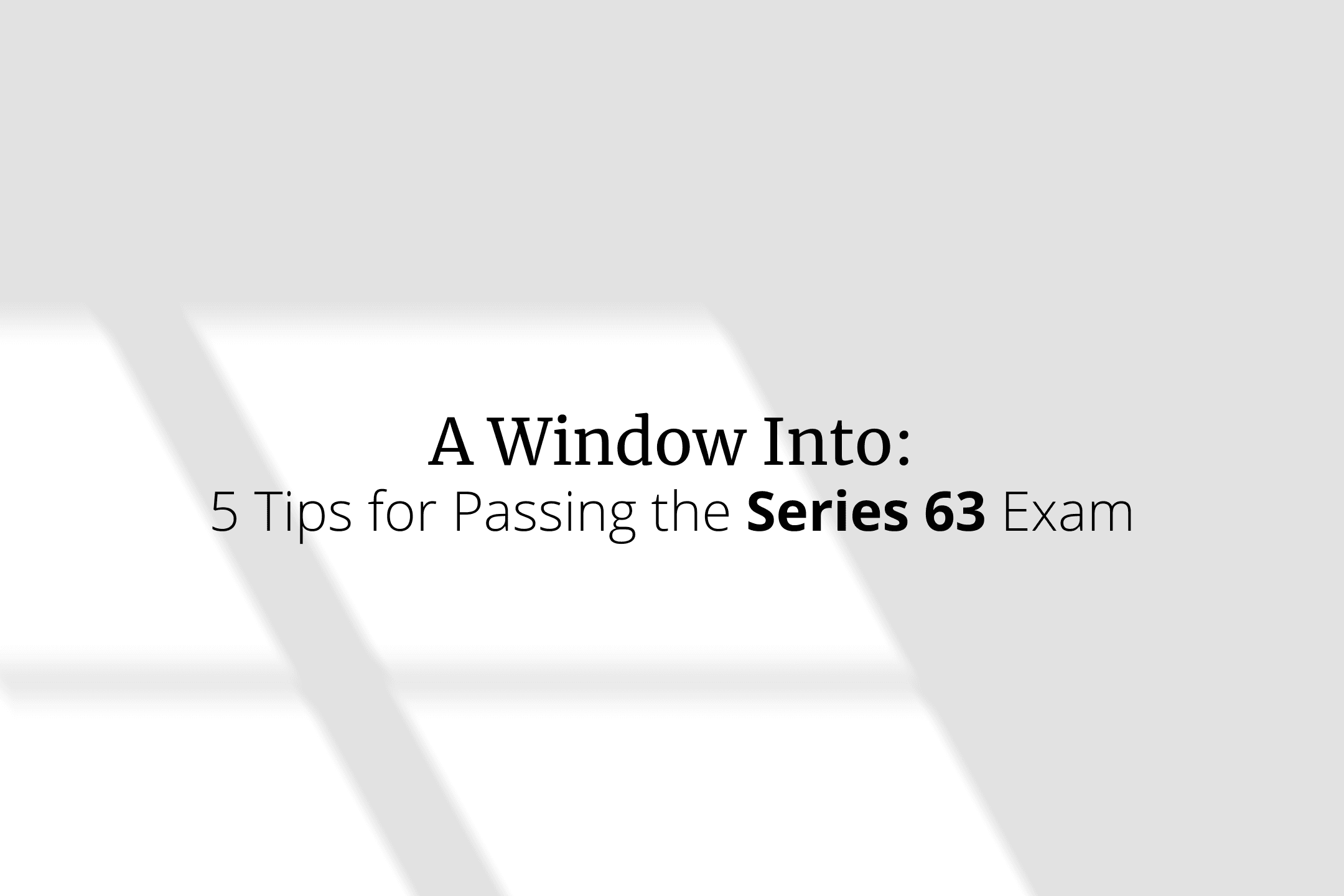5 Tips to Increase Your Chances of Passing the Series 63 Exam
Filed in: Series 63, Study Essentials, Study Tips

If you’re a financial professional or student seeking licensing, then the Series 63 exam could be part of the journey along your professional career.
The Series 63 exam is designed to qualify candidates as securities agents. Many states require a passing score before a financial professional can buy and sell securities and other financial products on an investor’s behalf.
The Series 63 can be challenging because of the short amount of time available to complete it. Testing time is 75 minutes, leaving you only over a minute to answer each of the exam’s 60 questions. Those who are underprepared may find the exam too difficult to pass the first time.
But with the right approach, a passing score on the Series 63 is obtainable. We’ve put together a five-step process for increasing your chances of passing the Series 63 exam.
5 Steps to Pass the Series 63 Exam
It typically takes between 20 and 30 hours to prepare for the Series 63 exam. We’ve broken down the process into the following five steps to make it less intimidating to accomplish.
1. Learn how to study more effectively
Imagine improving the quality and retention of every hour spent studying. Our
Study Essentials Course will help you supercharge your study process. Using science-backed techniques, we equip students to speed up the learning process while improving performance.
Our comprehensive approach to studying helps increase student confidence related to exams by 93%. This is why we offer our Study Essentials Course at no cost to all students enrolled in any Knopman Marks course.
This program also includes our high-performance tactics, or VIBES approach, which stands for:
- V – Start with vision
- I – Set an intention
- B – Remember to breathe
- E – Eliminate distractions
- S – Set your physical state (posture, energy, mood, and smile!)
By incorporating our techniques, you’ll transform self-doubt into confidence. This makes it easier (and more enjoyable) to move through the next prep process with better results.
2. Skim the textbook
Mastering and memorizing the rules and regulations in the material is not the goal during the early stages. Instead, get familiar with the concepts and topics on the exam by skimming the textbook.
Skimming is a strategic reading skill that can help you focus on the text’s main ideas in minimal time. To do so, move your eyes vertically as much as you move them horizontally. Read the first line of each paragraph and pay close attention to headings and subheadings. Skimming doesn’t mean skipping over sections and sentences. It simply means working your way through the text, noting the hurdles but walking around them (for now).
By skimming, you’ll be able to cover a heavy amount of material more quickly. You’ll also get the main points while making mental notes of what topics are going to require a more thorough approach.
3. Complete practice exams
After skimming the material, it’s time to complete two Series 63 practice exams.
The first exam covers all the topics in the textbook, while the second exam only covers units 1, 4, and 5. These three units make up an astounding 85% of the Series 63 exam, so it makes sense to spend more time practicing and drilling questions from these sections.
Score the exam questions as you go through the practice tests. When you encounter a confusing question or need help, pull out your textbook and read up on that section in the moment.
While skimming was the preferred method when first reading the material, now is the time to dive in. This is when you should fill in any knowledge gaps as they are identified.
4. Take good notes
At Knopman Marks, we offer live classes and on-demand programs. Both Series 63 courses cover the same content, so choose the presentation format that best fits your schedule and learning style. The included framework goes through all the regulatory regimes, ethical rules, and regulations you need to know.
Be sure to take good notes. These notes can help drill any tricky topics while serving as a roadmap through the material that can be reviewed later.
After class, continue practicing in the Q Bank and complete at least six more full-length practice exams. The best Series 63 exam prep includes taking multiple practice tests, so alternate between the exam covering all topics and the version focusing on units 1, 4, and 5.
Your goal is to reach a minimum score of 80% on at least two consecutive practice exams. Keep practicing until you reach this crucial benchmark. Review class notes, read supplemental materials, and dive as deep as possible into the heavily covered units.
5. Predict your score
Once you hit 80% on your Q Banks, it’s time to take the final benchmark exam. Our Series 63 practice exam can predict within a couple points what you’ll likely score on the actual test.
We recommend taking this at the end of the process to instill a high level of confidence. A passing score on the final benchmark exam confirms you’ve mastered the required material. You’ll complete your preparations knowing you’re in a solid position to pass the Series 63.
Learn more about how to pass the Series 63 exam here.
Written by Ernie Varela
Dr. Ernesto (Ernie) Varela, CFP® has worked for decades as a professor, trainer, and thought leader. He has held his Certified Financial Planner (CFP®) license for more than 20 years, and has worked for several financial service companies in leadership roles. His doctorate is in Organizational Leadership, and he also holds advanced degrees in Business and Literature. Ernie has taught adults in classroom and online settings for decades.
Related posts
- Read more
Exam Tips to Perform Under Pressure
High-stakes securities exams such as the SIE, Series 65, Series 79, or Series 24 can feel overwhe
- Read more
Efficient Exam Prep for Busy Professionals: Strategy Advising
Studying for a high-stakes securities exam like the Series 24 or Series 79 isn’t just about putti
- Read more
Crush the SIE Exam with the Video Vault
Are you feeling overwhelmed by the sheer volume of Securities Industry Essentials (SIE) exam cont


